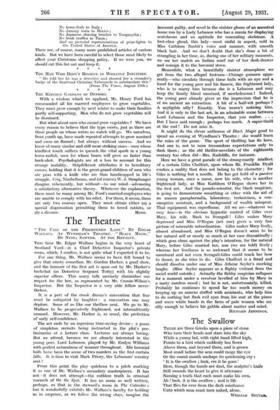The Theatre
"Tux CASE OF THE FRIGHTENED LADY." BY EDGAR WALLACE. AT WYNDHAM'S THEATRE. "BLACK MAGIC." BY NESTA SAWYER. AT THE ROYALTY.
Tins time Mr. Edgar Wallace begins in the very heart of Scotland Yard—in a Chief Detective Inspector's private room, which, I confess, is not quite what I expected it to be.
For one thing, Mr. Wallace seems to have felt bound to give that crusty comedian, Mr. Gordon Harker, a good show, and the humour of the first act is spun out by Mr. Harker's backchat (as Detective Sergeant Totty) with his slightly superior officer. This saucy talk unwisely diminishes our respect for the law, as represented by Mr. Cronin-Wilson's Inspector. But the Inspector is a very able fellow never- theless.
It is a part of the crook drama's convention that fear must be mitigated by laughter : a convention one may deplore. Some of us like our thrillers neat. We go to Mr. Wallace to be progressively frightened, not intermittently amused. However, Mr. Harker is, as usual, the perfection of surly self-confidence.
The act ends by an ingenious time-saving device : a posse of simpleton recruits being instructed in the plot's pre- liminaries at a lecture class. Lectures are always boring. But we attend, because we are already interested in the young peer, Lord Lebanon, played by Mr. Emlyn Williams with perfect naturalness of manner throughout. His baronial halls have been the scene of two murders as the first curtain falls. It is time to visit Mark Priory, the Lebanons' country seat !
From this point the play quickens to a pitch marking it as one of Mr. Wallace's secondary masterpieces. It has not--it does not attempt—the ruthless truth in criminal research of On the Spot. It has no scene so well written, perhaps, as that in the steward's room in The Calendar ; but it wonderfully exhibits Mr. Wallace's faculty for holding us in suspense, as we follow the wrong clues, imagine the
innocent guilty, and revel in the sinister gloom of an ancestral home run by a Lady Lebanon who has a mania for displaying scutcheons and an aptitude for concealing skeletons. A first-class ghoul, this lady—most sinful in aspect, cold in Miss Cathleen Nesbit's voice and manner, with smooth
black hair. And we don't doubt that she's done a bit of strangling in her time, as, during one of her solitary moments, we see her snatch an Indian scarf out of her desk-drawer and consign it to the baronial Stove.
Meanwhile, what a beautifully sinister atmosphere we get from the two alleged footmen—Chicago gunmen appa-
rently—who circulate through these balls with an eye and a hand for the young peer and his fiancee, the frightened lady, who is to marry him because she is a Lebanon and may keep the family blood unmixed, if unwholesome ! Indeed, the young peer already gives us the impression that he is of too ancient an extraction. A bit of a half-wit perhaps ? A negligible silly ? Exactly. You weren't noticing him. And it is only in the last act, in an admirable scene between Lord Lebanon and the Inspector, that you realize. . . . But I have said enough ; perhaps too much. A super-thrill at the end ! Do not miss it.
It might do the clever authoress of Black Magic good to spend an evening at Wyndham's Theatre : she would learn the rules of the game. The sport of thrilling has its laws. And one is, not to raise tremendous expectations only to dash them ; as the old thriller-novelists of the eighteenth century too often did—Mrs. Radcliffe, for instance.
Here we have a great parade of the strong-manly intellect of a certain Giles Chalfont, upon whom Mr. Franklin Dyall confers a reality that does not belong to the character ; for Giles is nothing but a noodle. He has got hold of a passive young woman, once a nurse, now his wife, who is another frightened lady, as Miss Kathleen O'Regan shows her in the first act. And the pseudo-scientist, the black magician, is going to demonstrate something or other with the aid of an unseen paraphernalia, laboratory, technicians, a con- sumptive assistant, and a background of wealth misspent. That equipment was superfluous. All we see—whatever we may hear—is the obvious hypnotic control of Giles over Mary, his wife. Back to Svengali ! Giles makes Mary depressed and Miss O'Regan (act one) gives a very fine picture of miserable subordination. Giles makes Mary lively, almost abandoned, and Miss O'Regan doesn't seem to be her natural self or nearly so much at her ease dramatically : which goes clean against the play's intention, for the natural Mary, before Giles married her, was (we are told) lively ; whereas her liveliness is so awkward that it seems to be unnatural and not even Svengali-Giles could teach her how to dance, as she tries to do. Giles Chalfont is a fraud and should dissolve under one of Miss Athene Seyler's mocking laughs. (Miss Seyler appears as a flighty visitant from the social world outside.) Actually the flabby magician collapses for a moment under a revolver levelled at him by Mary in a nasty careless mood ; but he is not, unfortunately, killed. Probably he continues to spend far too much money on keeping up an annexe stuffed with assistants, who help him to do nothing but flash evil eyes from his seat at the piano and wave white hands in the faces of pale women who are silly enough to believe his gabble about matter and mind.
RICHARD JENNINGS.


























 Previous page
Previous page